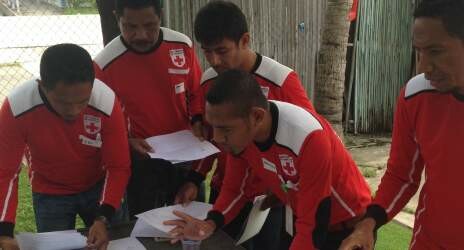
From 25- 26 February, IFRC and Cruz Vermelha de Timor Leste (Timor Leste Red Cross, also known as ‘CVTL’) participated in the Humanitarian Country Team disaster response simulation exercise, the outcomes of which recommended strengthening the national legal and policy framework for disaster management and response.
The simulation exercise was opened by the H.E Isabel Guterres, Minister of Social Solidarity, and was part of the process to “help the Government ensure that there is good overall coordination of all Government Ministries and the support of all other groups represented here”, as explained by the Minister. There were around 150 participants present, including UN agencies, the Red Cross Red Crescent Movement, local and international NGOs, faith-based groups, and a large contingent from the national military.
Like many simulation exercises that have taken place around the region, several legal issues emerged with regard to the initiation of international assistance and the procedures and requirements for the entry of relief goods and personnel. While the government was open to accepting foreign assistance, it was apparent from the exercise that there are a lack of clear rules and procedures to facilitate this. During the simulation debrief with the UN Resident Coordinator’s Office, and ensuing discussions between the National Disaster Management Directorate (NDMD), CVTL, UNDP and IFRC, it was clear that this was a key gap that needs to be addressed - and that IFRC and CVTL can provide support on this.
In his closing remarks at the simulation, Mr. Francisco do Rosario, Director of the NDMD, highlighted how this event “has been very important for Timor-Leste. It has allowed us to work together, some of us for the first time…It gave us a chance to look at what works and what does not. The lessons learned are very important and will help us in our planning into the future”.
Prior to the simulation exercise, UN OCHA held a civil-military coordination workshop during which the IFRC’s Regional Disaster Law Delegate, Lucia Cipullo, delivered a presentation on international disaster response law (IDRL). Though IDRL is not targeted at militaries per se, both civil and military actors can face the same barriers in terms of access and facilitation of goods and personnel, Ms. Cipullo explained. Ms. Cipullo also described how the Red Cross Red Crescent Movement’s fundamental principles and rules shape how they cooperate with military responders in crises.
That same week, an introductory session on disaster law was held for CVTL staff at their new headquarters in Dili, which was opened by the CVTL President Mr. José Pereira Da Conceição. Over the past 6 months CVTL and IFRC have been engaged in the revision of the national disaster management policy in Timor Leste, and have had ongoing discussions with the NDMD, UNDP and other key stakeholders about the development of a new disaster management law. As a key humanitarian actor and auxiliary to the government in Timor Leste, CVTL is in a prime position to take part in these national law and policy development processes, with technical support from the IFRC’s Disaster Law Programme.
President José explained that many new laws will be developed in Timor, but the disaster management law is particularly important for CVTL in order to ensure that core humanitarian principles are included, as well as recognition of CVTL as a first, direct responder. It also provides an opportunity to highlight links with their community level work.
“CVTL’s experience and close links with communities across the country puts them in a unique position to support the Government to develop stronger national legal frameworks for disaster management and response, and create an enabling environment that will improve community resilience”, explains the IFRC Head of Country Delegation in Dili, Kathryn Clarkson.
The timing of these developments are also significant in the lead up to the World Conference on Disaster Risk Reduction (WCDRR) in Japan this March, and are milestones which the delegation from Timor Leste, including the President from CVTL, can highlight at this global event.
All in all, it was a productive week for disaster law in Timor Leste – and an opportune time to engage and contribute to the development of a new legal and policy framework for disaster management in this relatively new nation.